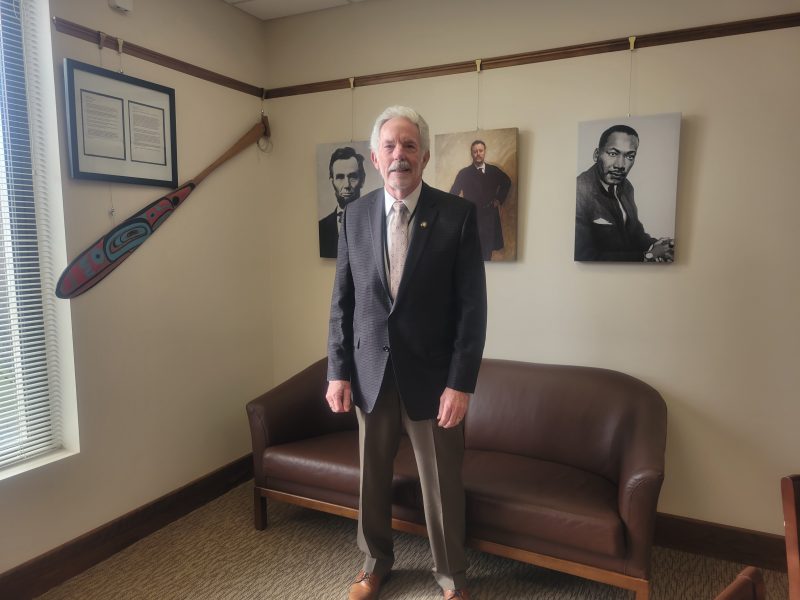
State Senator Dick Anderson, (R)-District 5, sat down for an interview with Lincoln City Homepage to share his thoughts on the upcoming 82nd congress which started Jan. 17.
Homepage: “You’ve just finished your first biennium any thoughts, reflections or surprises?”
Anderson: “I don’t think there were any surprises because I was well acquainted with the system. Good people, a lot of agreement. Disagreements were usually on how to get to the end game.
“The early reaction that I had at the end of the long session in 2021 was one word: ‘undervalued.’
“Where does a minority party senator have any real input? People were courteous. I was never hammered down in committee meetings and people would listen but did it really have an impact? ‘Undervalued.’
“That is why I took a different tack after the short session in (participating in) Task Force meetings to have some influence in how bills were going to be crafted.”
Homepage: “You’re a first time Senator, what has the reaction been from others that have been in the legislature longer than you?”
Anderson: “I was pleased because I’ve had a lot of compliments of my ability, as a Freshman Senator, to grab hold of what is going on within the process. And by my committee assignments and continually being asked to participate in things. I’m pleased where I’m positioned.”

Homepage: What’s an average day like for a state senator?”
Anderson: “I commute to Salem for 8 a.m. meetings. So I get there well before eight to get ready. Committee meetings will be an hour and a half down in the hearing rooms. Then I’ll have a floor session at 11 a.m. and the Republican caucus will meet beforehand at around 10 a.m. to go over bills. We do try to wrap up the day around 5 p.m.”
Homepage: “So, clearly this is a fulltime job.”
Anderson went on to explain the demands on his time after scheduled hours on things like meeting with different lobbying groups, concerned citizens, driving to locations within his district to attend meetings and view proposed projects.
“I joke that I gave up golf as a hobby for this,” he said.
“This is a citizen’s legislature. It’s a full time job. So, for me, it worked well because I’m retired. I can’t imagine how a person that has to work in a job can get time off. I don’t think we’re very considerate of that. It’s one thing to take a leave of absence for six months (for the long session) or thirty-five days in (short session) but the rest of the year there are meetings all day long and at inconvenient times.”
Homepage: “Do you have staff to help you?”
Anderson: “I have great staff. One full time Chief of Staff and during sessions I have the funds to add a second person essentially to take calls and respond to emails and such. And interestingly enough we have Megan Davis, who received a Sea Grant fellowship to work on her doctoral degree, helping with ocean related legislative issues for the Coastal Caucus. She will be working for the entire long session with both my and Representative David Gomberg’s (D-House District 10) offices.
Homepage: “The Siletz reservation falls within your district. What is the state’s relationship with them as a sovereign nation?”
Anderson: “They are a separate nation but they’re included. They need to have a voice. I’ve advocated that and have voted no on some bills because they (Confederated Tribes of Siletz Indians) weren’t included, but impacted.”
Homepage: “Do you have an example?”
Anderson: The Forest Accord. How to manage forests. The governor (former Governor Kate Brown) brought together (various stakeholders) and came up with an accord on how to best manage forests. They left the Tribes out. The Tribes weren’t at the table. My floor speech was, ‘I’ve heard all session about needing to involve everybody and here’s an example of where that didn’t happen.’ As a matter of fact, I introduced a bill to push the conversation whenever natural resources or gambling or any of these things that the tribes have an interest in. They need to be at the table. It went nowhere.”
Anderson: “I’ve got four of the nine federally recognized tribes in Oregon in my district and five of the casinos. And generally they’re the largest employer. There’s an economic impact and they are not to be ignored.”
Homepage: “Any last thoughts on the upcoming session?”
Anderson: “It’s not for everybody quite frankly. I think you would need counseling or therapy if you do this job. It can be tough in places; the criticism. Not everybody loves you. You’re going to make fifty-percent of the people mad with every vote. In the end I’m voting for what I think my district needs.”
Homepage: “Thank you for your time.”
Anderson: “Anytime, always happy to answer questions when I’m able.”









Well, my household voted for Anderson, but were eventually disappointed by
a wishey washy answer to the covid issue, the vague answer being “follow the science”. I can’t think of a more indecisive and Charlie Brown answer, then measure 114, no reply at all, I get it, you have to play both sides. Will I ever
vote democrat? Unlikely, but some republicans with fortitude would be nice.